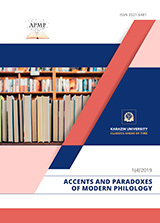The Conquest and Resistance, a Woman and a Man: Feminist and Imagological Reading of W. S. Maugham’s “The Unconquered”
Abstract
In the paper, the national and women’s contexts closely interrelated in W. S. Maugham’s “The Unconquered” short story (1943) are being examined. While analysing the ground of the conquest and resistance, it is concluded that war conquering and sexual violence are aimed to establish the men’s power over certain part of the world. In some ways, capturing a woman and occupying the land are considered equal things under the patriarchal rules. With this in mind, any male conqueror tries to reach both of them not only for the sake of victory, but also for approval his status of a worthy member of a men-ruling society (a nation). Next, the role of stereotypes as an engine of all negative phenomena of national and gender non-understanding, in particular, war and various kinds of inequality, is stressed. Tracing the complex relationship between, on the one hand, Frenchmen and Germans, and women and men, on the other hand, it should be token that the final infanticide is multivalued whereas it means the woman’s liberation and revenge for the men’s world, as well as is an apogee of national resistance.
Downloads
References
Beauvoir, S. de. (1961). The Second Sex. New York: Grune and Stratton.
Leerssen, J. (2016). Imagology: On Using Ethnicity to Make Sense of the World. Les stéréotypes dans la construction des identités nationales depuis une perspective transnationale, 10, pp. 13–31.
Maugham, W. S. (1955). The Complete Short Stories of W. Somerset Maugham, Vol. I. London: William Heinemann Ltd.
Mayer, T. (ed.). (2000). Gender Ironies of Nationalism: Sexing the Nation. London; New York: Routledge.
Mittermaier, Ute Anna. (2007). No More than Human by Maura Laverty: Impressions of a Reluctant Governess in Spain. Estudios Irlandeses, 2, pp. 135–150.
Movaghati, S. (2016). What Goes Around, Comes Around: The Manifestation of Peripeteia in Maugham’s The Unconquered. International Journal of Comparative Literature & Translation Studies, 4, 4, pp. 57–59.
Nagel, J. (1998). Masculinity and Nationalism: Gender and Sexuality in the Making of Nations. Ethnic and Racial Studies, 21, 2, pp. 242–269.
Pageaux, D.-H. (1981). Une Perspective D'études en Littérature Comparée: L'imagerie Culturelle. Synthesis, VIII, pp. 169–185.
Papic, Z. (1994). Nationalism, Patriarchy and War in Ex-Yugoslavia. Women’s History Review, 3, 1, pp. 115–117.
Weaver, J. C. B. (2011). Adolf Hitler’s account of the ‘Nation’ and ‘Nationalism.’ [Blog] E-International Relations Blog. Retreived from at: https://www.e-ir.info/2011/05/16/adolf-hitlers-account-of-the-%E2%80%98nation%E2%80%99-and-%E2%80%98nationalism%E2%80%99/#_ftn1
Wellisch, E. (1954). Isaac and Oedipus: A Study in Biblical Psychology of the Sacrifice of Isaac. London: Routledge.




